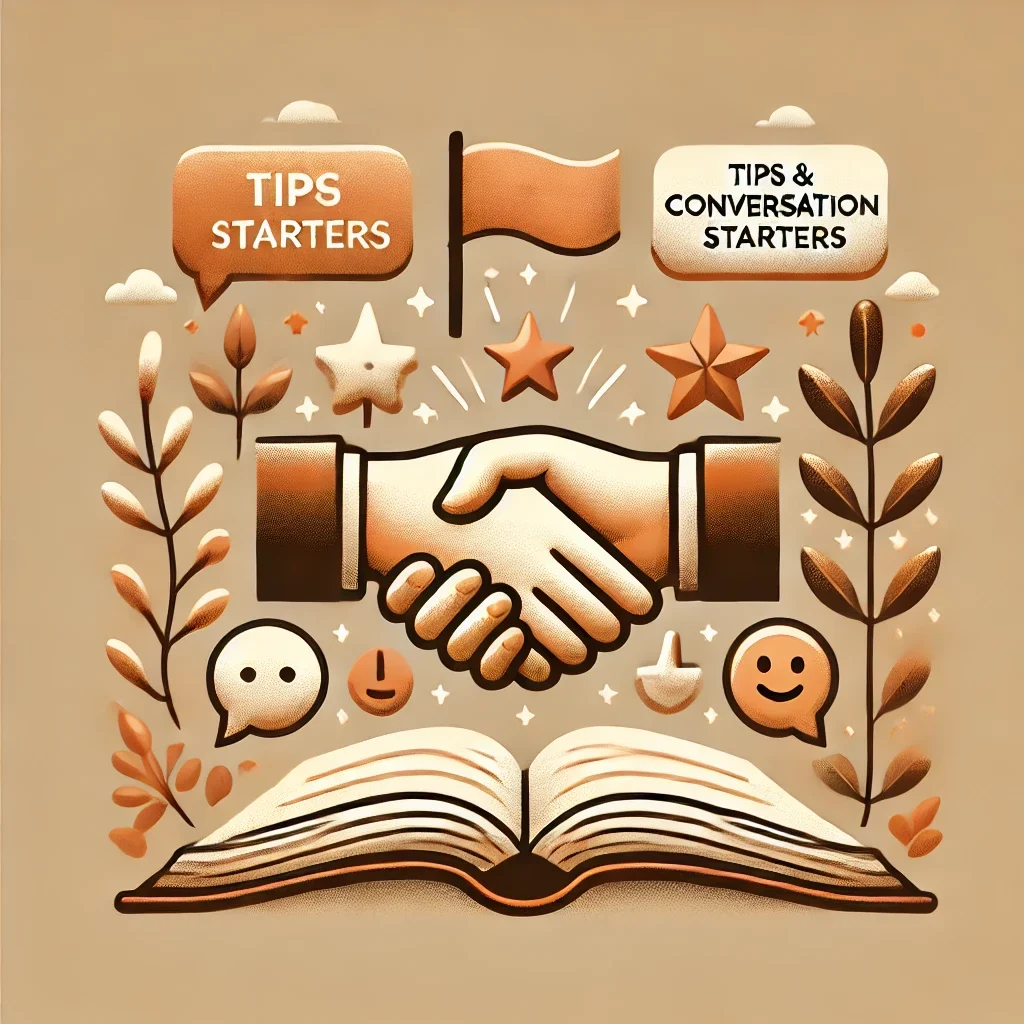Tips and Conversation Starters to Keep the Conversation Engaging and Beneficial

Here are some tips and conversation starters to help keep your interactions engaging and beneficial for both of you:
- Follow Up on Previous Topics:
- “Hi (his/her name)! How was your day? Did you get a chance to do more of [hobby or activity you discussed before]?”
- “I was thinking about our conversation on education. What’s your favourite subject in school/college?”
- Introduce New Interesting Topics:
- “I read an interesting article about [a topic you’re interested in]. What are your thoughts on it?”
- “Have you seen any good movies or read any interesting books lately?”
- Share Experiences and Ask for Opinions:
- “I recently tried [a new activity or food]. Have you ever tried it?”
- “I’m thinking of starting a new hobby. Do you have any recommendations?”
- Language Practice:
- “I learned a new word/phrase today: [word/phrase]. Have you come across any new English words recently?”
- “Would you like to practice a short conversation in English about [a specific topic]?”
- Cultural Exchange:
- “Can you tell me more about a traditional festival or custom in your country? I’d love to learn more about your culture.”
- “In my country, we have a tradition called [tradition]. How do you celebrate [similar event] in [your country]?”
- Future Plans:
- “Do you have any plans for the weekend?”
- “What are you looking forward to this month?”
- Games and Fun Activities:
- “Shall we play a quick word game or quiz in English? It could be fun and helpful for our practice.”
- “I found a fun language learning app/game. Would you like to try it together?”
By showing genuine interest in their responses and sharing your own experiences, You can create a balanced and engaging conversation. Remember to listen actively and be respectful of their thoughts and opinions.
Additional Tips for Smooth and Enjoyable Conversations

- Positive Reinforcement:
- Compliment their efforts in learning English: “You’re doing great with your English. I can see improvement!”
- Encourage them to share more: “That’s really interesting. Tell me more about it.”
- Mindfulness of Pace and Understanding:
- Speak clearly and at a moderate pace.
- If something isn’t clear, ask for clarification: “I’m not sure I understood that. Could you explain it again?”
- Setting Goals Together:
- Discuss setting small, mutual goals for your practice sessions: “How about we each prepare a short story to share next time?”
- Feedback Exchange:
- Offer constructive feedback and ask for the same: “Do you think there’s something I could improve in my speaking? I’d love your feedback.”
- Use Visual Aids:
- Share images, articles, or short videos related to your topics of discussion to make the conversation more engaging.
- Stay Relaxed and Friendly:
- Keep the tone light and friendly. Use humour when appropriate to keep the conversation enjoyable.
- Be Patient and Supportive:
- Learning a new language takes time. Be patient with each other’s progress and support one another.
- Follow Up on Previous Conversations:
- Remember key points from previous talks and follow-up: “Last time, you mentioned you were working on a project. How’s that going?”
Enhancing the Quality of Your Conversations

Here are some more tips to make your conversations even more fruitful:
- Use Open-Ended Questions:
- These encourage more detailed responses and keep the conversation flowing: “What do you enjoy most about your favourite hobby?”
- Role-Playing Scenarios:
- Practice common situations in English, like ordering food at a restaurant or asking for directions. This can be fun and practical.
- Discuss Current Events:
- Talking about recent news or events can provide fresh and engaging content: “Did you hear about [recent news]? What do you think about it?”
- Language Challenges:
- Set small challenges for each other, like using a new word in a sentence or writing a short paragraph on a given topic.
- Share Personal Stories:
- Personal anecdotes can make conversations more engaging and relatable: “One funny thing that happened to me this week was…”
- Teach Each Other:
- Share knowledge about your respective languages and cultures. This mutual teaching can be very enriching.
- Incorporate Technology:
- Use language learning apps or websites together. You can take quizzes, play games, or go through exercises.
- Express Appreciation:
- Show gratitude for the time and effort they are putting into your conversations: “I really enjoy our talks and appreciate your efforts in helping me improve my English.”
- Celebrate Progress:
- Acknowledge improvements, no matter how small: “We’ve come a long way since our first conversation. It’s great to see our progress!”
- Stay Consistent:
- Consistent practice is essential. Try to have a consistent schedule for your conversations.
By incorporating these additional tips, you can further enhance the quality and enjoyment of your conversations.
Advanced Strategies for Dynamic Conversations

Here are a few more advanced strategies and tips to keep your conversations dynamic and beneficial:
- Set Learning Objectives:
- Before each session, set specific objectives, like focusing on vocabulary related to a particular topic or practising a specific grammar point.
- Incorporate Music and Lyrics:
- Discuss favourite songs and analyse lyrics together. This can help with understanding colloquial language and cultural nuances.
- News Articles and Opinion Pieces:
- Read short news articles or opinion pieces and discuss your views on them. This can improve comprehension and critical thinking skills.
- Cultural Stories and Folktales:
- Share and discuss folktales or cultural stories from your respective countries. This can be a great way to learn about each other’s cultures and traditions.
- Create a Joint Blog:
- Start a blog together where you can write about your learning journey, share tips, and post your progress. This can be motivating and a fun way to document your improvements.
- Mock Interviews:
- Conduct mock job or college interviews. This can help improve formal English and prepare for real-life situations.
- Language Journals:
- Keep a language journal where you write daily or weekly entries. Share your entries with each other and provide feedback.
- Grammar Challenges:
- Take turns giving each other small grammar quizzes or challenges. This can help reinforce grammatical rules in a fun way.
- Analyse Speeches:
- Watch famous speeches together and analyse the speaker’s language, tone, and style. Discuss what makes the speech effective.
- Use Role Models:
- Discuss role models or influential figures in your lives. Explain why they inspire you and what you’ve learned from them.
- Personal Development Topics:
- Talk about personal development topics such as time management, setting goals, and overcoming challenges. This can lead to deep, meaningful conversations.
- Book Discussions:
- Choose a book to read simultaneously and discuss it chapter by chapter. This can enhance reading comprehension and analytical skills.
- Feedback Sessions:
- Regularly dedicate part of your conversation to providing constructive feedback on each other’s language use. Focus on pronunciation, vocabulary, and grammar.
- Explore Dialects and Accents:
- Learn about different English dialects and accents. Try mimicking them for fun and to improve your listening and speaking skills.
- Celebrate Milestones:
- Celebrate your learning milestones together. Whether it’s completing a book, mastering a difficult topic, or improving fluency, recognize and celebrate your achievements.

By incorporating these advanced strategies, you can continue to make your conversations engaging, educational, and enjoyable. Keep up the great work, and enjoy your language-learning journey!
